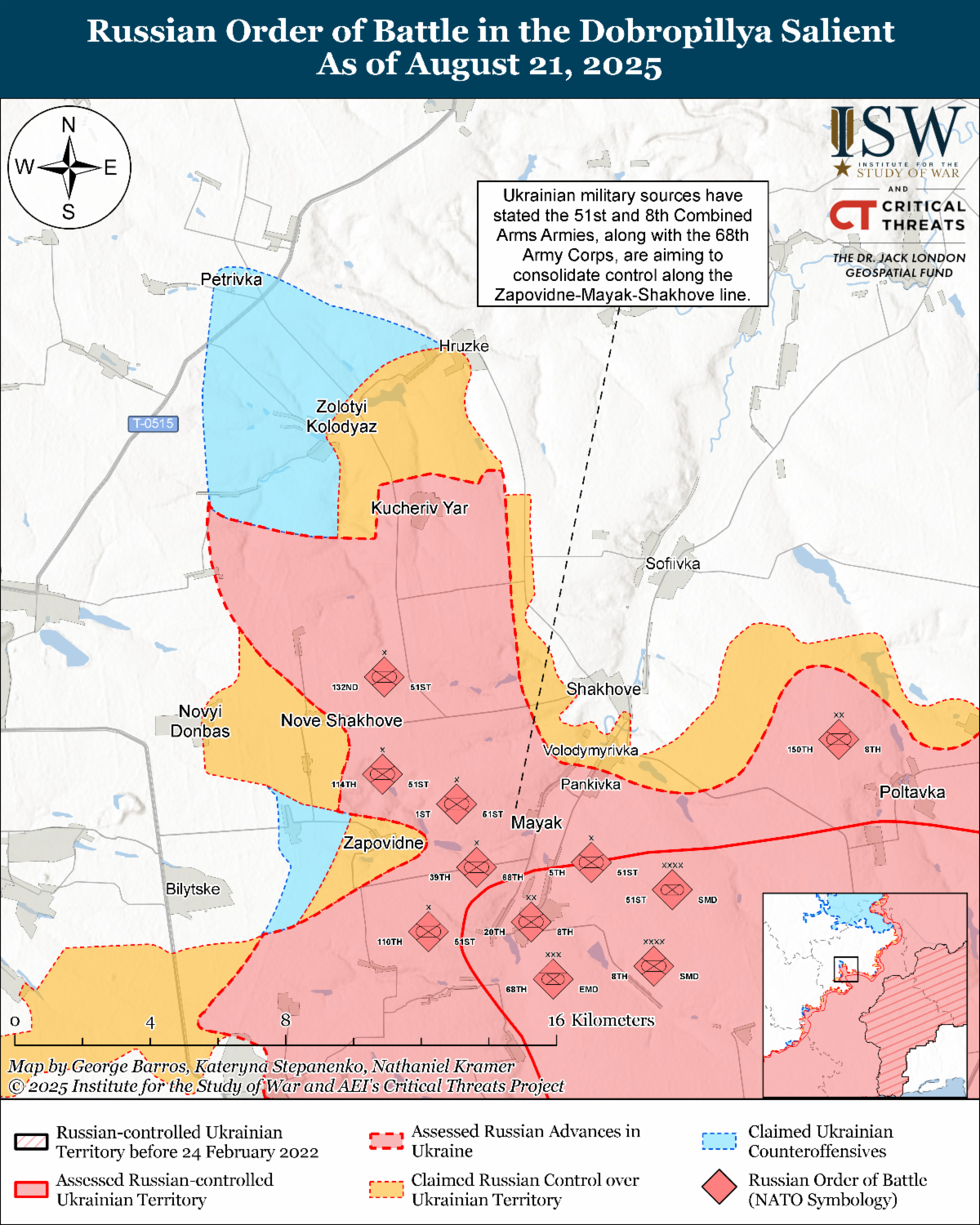The Kremlin continues to insist that the 2022 Istanbul negotiations are the only acceptable departure point for potential future negotiations on the war in Ukraine, thereby demanding that Russia and its allies reserve the right to veto any Western military assistance to Ukraine and that Ukraine be left neutered and defenseless against future Russian aggression. Russian Foreign Minister Sergey Lavrov stated during a joint press conference with Indian External Affairs Minister Subrahmanyam Jaishankar on August 21 that Russia will proceed on the issue of security guarantees for Ukraine based on its experience with the 2015 Minsk II agreement and 2022 Istanbul negotiations. Lavrov claimed that the 2022 Istanbul negotiations were based on the concept of "eliminating the root causes" of the war in Ukraine, referencing the Kremlin’s oft-evoked accusation that the "root causes" of the war include NATO’s eastward expansion and Ukraine’s alleged discrimination against Russian speakers and the Moscow-linked Ukrainian Orthodox Church. Lavrov claimed that the 2022 Istanbul negotiations would have ensured Ukraine’s security "honestly and collectively" via a group of guarantor countries including United Nations Security Council (UNSC) permanent members, Germany, and Turkey. Lavrov similarly stated on August 20 during a meeting with Jordanian officials that Russia was ready to sign on to an agreement based on the 2022 Istanbul negotiations and that those negotiations are a “good example” of a way to negotiate an end to the war.
Lavrov’s recent statements lauding the 2022 Istanbul negotiations suggest that the Kremlin has selected Lavrov to be the predominant amplifier of the longstanding Russian narrative that the Istanbul negotiations are the necessary starting point for negotiations. An agreement based on the 2022 Istanbul negotiations would have crippled Ukraine by permanently banning it from joining NATO, imposing draconian limitations on the size of the Ukrainian military, and prohibiting Ukraine from receiving any Western military assistance. The draft agreement also demanded that Russia and the UNSC, including the People’s Republic of China (PRC, a key Russian ally), be granted the status of guarantor states and that guarantor states must act in concert in the event of a violation of the agreement, which would allow Russia to veto Western military assistance for Ukraine. The draft Istanbul agreement notably imposes no limitations on Russia’s military capabilities—effectively neutering Ukraine politically and militarily while protecting Russia’s ability to reinvade Ukraine in the future on much more favorable terms even than it faced in 2022. The Kremlin likely understands that the 2022 Istanbul framework is a non-starter for Kyiv and therefore continues to invoke it in an effort to paint Ukraine as unwilling to negotiate while Moscow continues to delay good-faith peacemaking efforts.
The Kremlin continues to categorically reject US-backed security guarantees for Ukraine and reveal its continued objectives of seizing control of all of Ukraine. Russian Security Council Deputy Chairperson Dmitry Medvedev explicitly rejected US- and European-led efforts to provide Ukraine with reliable security guarantees by reiterating on his English-language X (formerly Twitter) account on August 20 that "[Russia has] explicitly stated: No NATO troops as peacekeepers" and that Russia will not accept such a security guarantee. Medvedev claimed that Ukraine does not need such security guarantees, contrary to the Trump administration's position on Ukraine's need for robust security guarantees. Russian State Duma Deputy Alexei Zhuravlev claimed on August 21 that Ukraine should emulate Finland's negotiation model following World War II and become a neutral state and cede part of its territory and that negotiations will be based on battlefield dynamics. State Duma Deputy Dmitry Belik echoed Zhuravlev's sentiments by claiming that Ukraine's attempts to alter its own territorial borders ignores the realities on the ground. Kremlin officials often use the idea of "realities on the ground" to claim that Russia is in a superior position on the battlefield and to demand that Ukraine concede to Russia's demands. Chairperson of the Russian Federation Council Committee on International Affairs Grigory Karasin claimed on August 21 that stakeholders must understand that Russia is concerned about its strategic security vis a vis Europe and NATO and that this raises questions about the overall viability of the entire negotiation process. Several Kremlin officials claimed that Russia is defending new territories that are enshrined in Russia's Constitution and therefore international recognition of Russia's annexation is unnecessary, obfuscating the fact that Russia's occupation and annexation of Crimea and Kherson, Zaporizhia, Donetsk, and Luhansk oblasts is illegal under international law. Kherson Oblast occupation governor Vladimir Saldo claimed that Donbas and Novorossiya – which Russian officials have defined as all of eastern and southern Ukraine – are original Russian lands and cannot be part of any territorial concession to Ukraine. Russian reserve Colonel Viktor Baranets claimed on August 20 that Russia may allow European peacekeeping troops in Ukraine in exchange for Ukraine ceding all of its southern oblasts, including Odesa, Mykolaiv, and perhaps Kharkiv, to Russia. Russia notably does not occupy any part of Odesa Oblast and occupies slivers of Kharkiv and Mykolaiv oblasts. | 




 [ISW] 이란 업데이트, 2025년 8월 21일
[ISW] 이란 업데이트, 2025년 8월 21일
 [ISW] 러시아 점령 업데이트, 2025년 8월 21일
[ISW] 러시아 점령 업데이트, 2025년 8월 21일


















